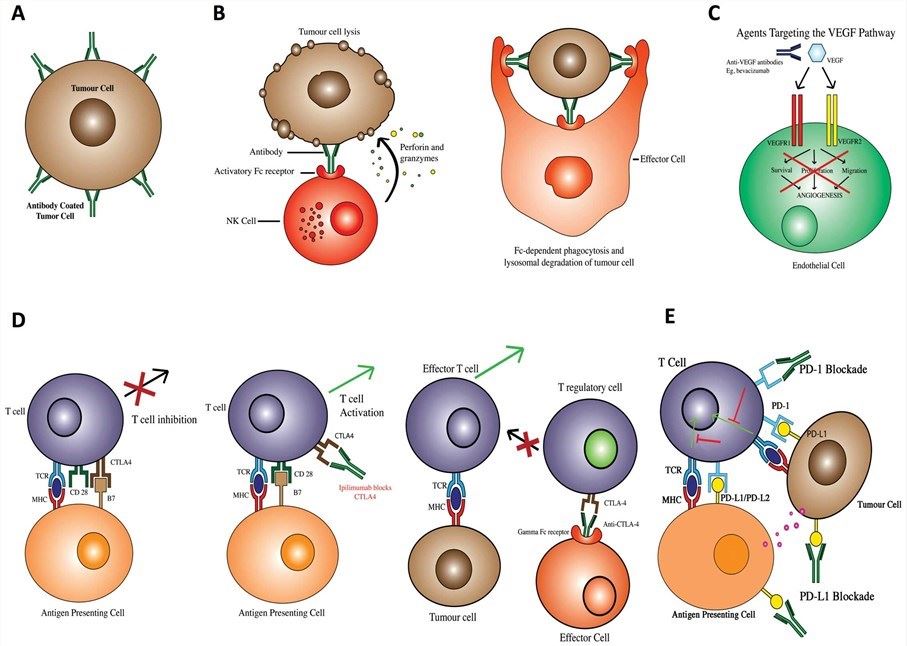Currently, antibody products, particularly the monoclonal antibodies (mAbs), play an important role in the growing biopharmaceutical drug discovery market. The development of mAb therapeutics and their derivatives almost presents the most effective choice for treatment of various disease types. Backed up by a group of professional scientists who are committed to therapeutic antibody development, Creative Biolabs offers a full range of antibody functional assays to in-depth validate your antibody candidates at an early stage. Our experienced scientists will take part in every step of your program to accelerate your project development.
Functions of Therapeutic Antibodies
Therapeutic IgG antibodies are multifunctional proteins whose efficacy attributes to either the antigen-binding site or the crystallizable fragment (Fc). These two parts can induce different immune responses and biological functions through either antigen-specific binding ability or the interaction of complement components and Fcγ receptors. The therapeutic effects of mAbs and their derivates (e.g., antibody drug conjugates (ADCs), and Fc-fusion proteins) can be mediated by different mechanisms (Fig.1), including but not limited to:
-
Direct blocking of ligand-receptor interaction
-
Agonist activity on a receptor to trigger downstream signaling
-
Antibody-dependent cellular cytotoxicity (ADCC)
-
Antibody-dependent cellular phagocytosis (ADCP)
-
Complement-dependent cytotoxicity (CDC)
-
Direct cell killing by induction of apoptosis
-
Receptor internalization and downmodulation
-
Inhibition of enzyme activity
-
Anti-angiogenesis to inhibit tumor formation
 Fig. 1 Possible mechanisms of action employed by monoclonal antibodies.1
Fig. 1 Possible mechanisms of action employed by monoclonal antibodies.1
Given that therapeutic antibodies rely on different types of MOAs to achieve clinical efficacy, it is essential to apply different strategies to assess the antibody functions, as well as to optimize the performance of antibody products using different engineering approaches. Here at Creative Biolabs, we are proud to present the most comprehensive list of assays for evaluating the functionality of antibody-based therapeutics.
The variable domain is specific region on an antibody that contributes to the binding of the corresponding antigen. The variable domain contains the paratope (the antigen-binding site), comprising a set of complementarity determining regions (CDRs) at the amino terminal end of the monomer. To assess the property of the variable domain properly, we provide diverse assay formats by employing various technical approaches, such as:
The Fc region is composed of two heavy chains that contribute two or three constant domains depending on the class of the antibody. The Fc region ensures that each antibody induces an appropriate immune response for a given antigen, by binding to a specific class of Fc receptors, and other immune molecules such as C1q. Consequently, antibodies can mediate different biological functions to enhance their efficacy. Furthermore, antibody Fc glycosylation plays an important role in the safety and efficacy of the molecule and therefore a critical quality attribute for the functional analysis. With profound expertise and state-of-the-art technology platforms, Creative Biolabs offers both effector functional assessment and engineering strategy (including glyco-optimization and protein engineering) for the Fc region.
If you are interested in our service, please do not hesitate to contact us for more details.
Reference
-
Malas, Sadek, et al. "Antibody therapies for melanoma: New and emerging opportunities to activate immunity." Oncology reports 32.3 (2014): 875-886.
For Research Use Only.
Copyright © 2024 Creative Biolabs.

 Fig. 1 Possible mechanisms of action employed by monoclonal antibodies.1
Fig. 1 Possible mechanisms of action employed by monoclonal antibodies.1